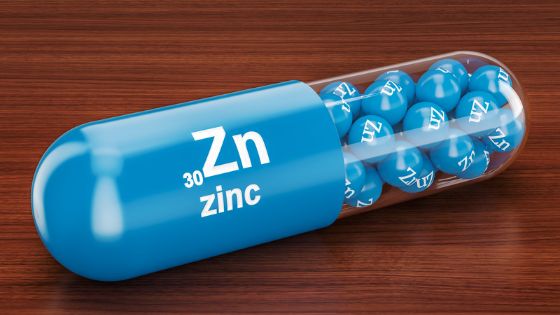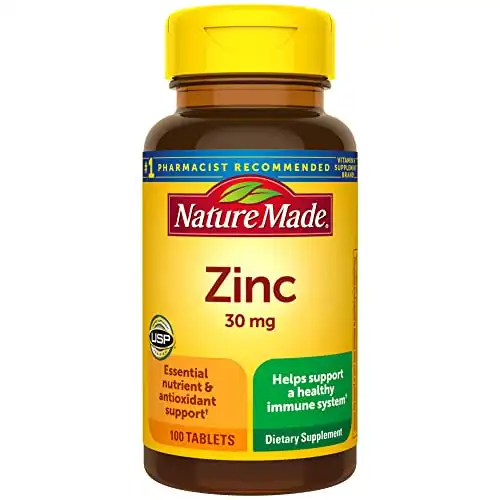Is 50mg of zinc too much? Let's find out!

Have you ever wondered if 50mg of zinc is too much? Are you looking for ways to boost your health and immunity? If so, you may have heard about zinc and its potential benefits.
Zinc is an essential mineral that plays a role in many vital functions of the body, including the immune system, metabolism, wound healing, and more.
However, it's essential to be aware of how much zinc is too much - as taking too high of doses can lead to side effects. In this article, we'll look at what happens when you consume 50mg of zinc daily – is it safe or not? Read on to find out!
- What is Zinc, and Why Is It Important for Health?
- Is 50mg of Zinc Too Much?
- How Much Zinc Should You Take Daily?
- Signs of Too Much Zinc in the Body
- 7 Foods Rich in Zinc to Include in Your Diet
- Supplements That Can Help Meet Your Recommended Daily Intake of Zinc
- 10 Tips for Ensuring a Balanced Intake of Essential Nutrients, Including Zinc
- Final words
What is Zinc, and Why Is It Important for Health?
Zinc is essential in foods such as meats, legumes, nuts, and grains. In addition, it's necessary for many bodily functions, including cell growth and repair, the breakdown of carbohydrates and proteins, managing hormone levels, reproduction, vision, and more.
In addition to its role in these processes, zinc is crucial to immune system health. Studies show it may help reduce inflammation and fight off infection. It may also be beneficial for skin health.
Is 50mg of Zinc Too Much?
Yes, 50mg of zinc is too much. The maximum recommended daily dose of zinc for adults 19 years, and older is 40mg, according to the Office of Dietary Supplements.
Consuming more than that could lead to several health risks, such as gastrointestinal distress, copper deficiency, weakened immunity, and an imbalance in other essential nutrients. Therefore it is vital to ensure you are not exceeding the recommended dosage when supplementing with zinc orally or topically.
How Much Zinc Should You Take Daily?

The recommended daily allowance (RDA) for zinc is 8-11 mg per day for adult males 19 years or older; 7-8 mg per day for adult females 19 years or older; 11 mg per day for pregnant women; and 12mg per day for lactating women.
Taking more than this can lead to side effects, including nausea, vomiting, diarrhea, stomach cramps, headaches, dizziness, and a metallic taste in the mouth.
In addition, taking too much zinc can interfere with absorbing other minerals like copper and iron. This can lead to deficiencies in those minerals.
It's important to note that high doses of zinc supplements are also not recommended during pregnancy or breastfeeding.
It's best to speak with your doctor before taking any supplement – especially if you take medications or have an existing medical condition. Your physician will know what is safe for you based on your needs and health history.
Signs of Too Much Zinc in the Body
If you take too much zinc, you may experience signs of an overdose. These can include nausea, vomiting, diarrhea, stomach cramps, headaches, dizziness, and a metallic taste in the mouth. Additionally, too much zinc can interfere with absorbing other minerals like copper and iron. This can lead to deficiencies in those minerals.
It's also important to note that taking high doses of zinc supplements is not recommended during pregnancy or breastfeeding.
7 Foods Rich in Zinc to Include in Your Diet
1) Shellfish
Oysters, crabs, and lobsters are all excellent sources of zinc. They are exceptionally high in zinc content compared to other types of seafood and can provide up to 76mg of zinc per 3 ounces.
2) Beef
Eating beef is a great way to get your daily dose of zinc. A 3-ounce serving of beef can provide up to 7mg of the mineral. It contains more zinc than pork or chicken, but limiting consumption is essential due to its higher fat content.
3) Beans
Beans are an excellent option if you're looking for plant-based sources of zinc. They contain up to 5mg per ½ cup serving and are a good source of protein, fiber, and other vitamins and minerals.
4) Nuts & Seeds
Nuts and seeds such as pumpkin seeds, almond nuts, sunflower seeds, cashews, peanuts, walnuts, and sesame seeds are all rich in zinc with about 2-4mg per ¼ cup serving (depending on the seed/nut).
They're also a great snack that can be enjoyed throughout the day or added to salads or other meals for extra flavor and nutrition.
5) Dairy Products
Dairy products such as yogurt, milk, or cheese are another great source of zinc, with around 1-2 mg per 8-ounce serving (depending on the product).
Yogurt is a perfect choice since it also provides probiotics which can help improve digestion and gut health.
6) Dark chocolate
Dark chocolate is an exciting source of zinc, with roughly 2mg per 1-ounce serving (of 72% cacao dark chocolate).
Choosing high-quality dark chocolate is essential since most brands contain added sugar and other unhealthy ingredients like vegetable oils, which can counteract the benefits of real dark chocolate.
7) Eggs
An egg contains up to 1 mg of zinc, depending on its size, making them a convenient way to get your daily dose without having to overeat food at once!
They also provide other essential nutrients such as protein and healthy fats, so try adding some eggs to your meal plan for extra nutrition and flavor!
Supplements That Can Help Meet Your Recommended Daily Intake of Zinc
Several options are available if you're looking to supplement your diet and reach the recommended daily zinc intake.
Zinc supplements come in many forms, such as capsules, tablets, liquids, and powders.
It's essential to speak with your doctor before taking any supplement – especially if you take medications or have an existing medical condition.
Your physician will know what is safe for you based on your needs and health history.
10 Tips for Ensuring a Balanced Intake of Essential Nutrients, Including Zinc
- Eat various foods to ensure you get all the essential nutrients, including zinc. Eating a wide range of fruits, vegetables, grains, proteins, and dairy can help to provide an adequate intake of all vitamins and minerals.
- Include seafood in your diet, as it is an excellent source of zinc. Oysters are exceptionally high in zinc content. Other seafood sources include crab, lobster, shrimp, salmon, and tuna.
- Ensure you're consuming enough whole grains, as these can provide a good source of zinc and other essential vitamins and minerals. Whole-grain bread, cereals, and oats are excellent sources.
- Incorporate legumes into your meals regularly as they are packed with protein and can also be a good source of zinc, depending on which type you choose (e.g., kidney beans).
- Consume eggs regularly as they are rich in several essential nutrients, including zinc.
- Choose organic animal products whenever possible, as these will contain more concentrated amounts of vitamins & minerals than their non-organic counterparts.
- Consider adding fortified breakfast cereals to your diet because they may be enriched with various vitamins & minerals, including zinc; look for ones labeled "fortified" or "enriched."
- Spice up your dishes with pumpkin seeds - not only do they add flavor, but they also contain high levels of zinc!
- Include nuts such as cashews or almonds in your daily snacks; these contain significant amounts of the mineral too!
- Opt for low-fat dairy options such as yogurt or kefir to get extra calcium while taking advantage of their zinc content!
Final words
In conclusion, consuming 50mg of zinc daily is too much and can lead to serious health risks. ItIt'sThereforeit's essential to follow the recommended dosage of 40mg for adults 19 years and older.
If you take any other medications or have a medical condition, you should speak with your doctor before taking a zinc supplement. Doing so will ensure safe levels for optimal health benefits.
DISCLAIMER: buildyourbody.org does not provide medical advice, examination, or diagnosis.
Medically reviewed and approved by Nataniel Josue M D.

